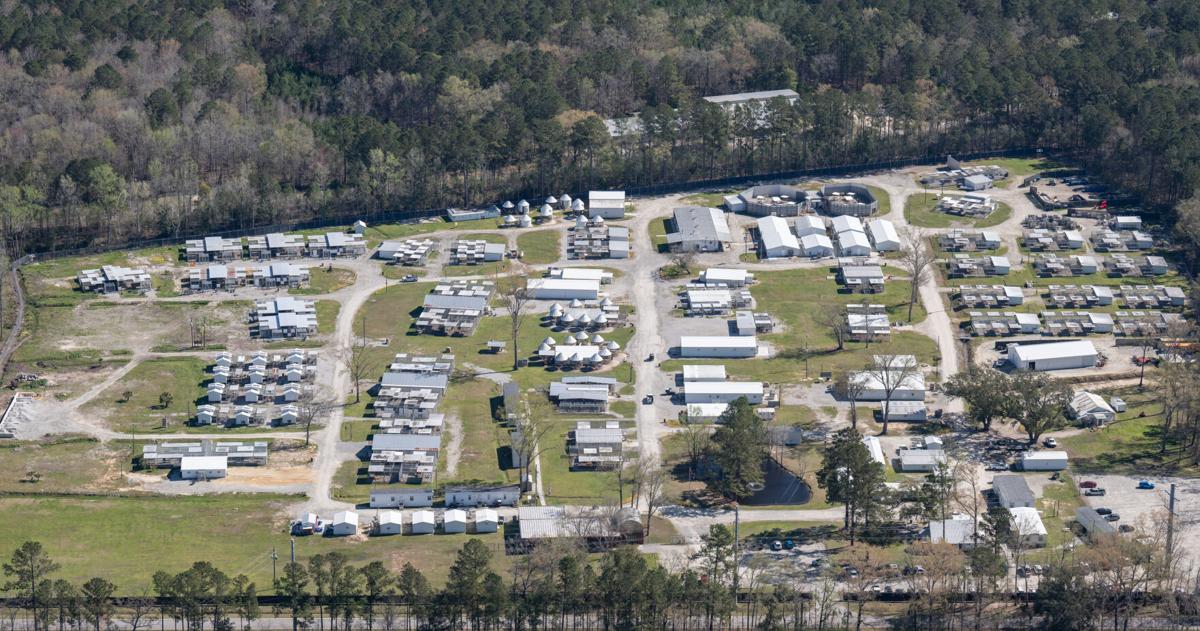Copyright Charleston Post and Courier

Late last year, as residents of a small Lowcountry town rounded up monkeys on the loose from a local breeding farm, work crews began preparing hundreds of other primates for grueling journeys across America’s highways. Unmarked trucks left from a loading dock in rural Yemassee, bound for labs in Colorado and Montana that are known to use primates in deadly experiments, even as townsfolk near the massive Alpha Genesis monkey farm scoured the woods looking for frightened escapees. South Carolina regulatory agencies take little notice of shipments in and out of the farm, one of the nation’s largest monkey vendors. The public has no way of knowing how often trucks leave the primate center, what the shipments contain or what their destination is. The information is treated as proprietary and does not have to be fully disclosed. Drivers are taught to exercise caution with their cargos because monkeys carry Herpes B, Shingella and athogens that can be spread by contact with humans. S.C.’s State Transport Police, which enforces federal regulations and state laws for commercial motor vehicles, said through a spokesperson that “because animals are living organisms, they are not considered hazardous materials and therefore, the trucks transporting animals would only be subject to standard federal regulations and state laws.” The secrecy and risks of transporting primates have come under new scrutiny after a Maryland-bound pickup truck and trailer carrying 21 research monkeys overturned on Mississippi’s Interstate 59 on Oct. 28 when a long-distance driver fell asleep at the wheel. The monkeys were shipped from the Tulane National Biomedical Research Center in Covington, La., which houses about 5,000 monkeys used for biomedical research. The accident was shrouded in misinformation that led to tragic consequences. A driver on a video at the accident scene told responding officers that they should “shoot them” because the monkeys were dangerous, leading officers to gun down five animals. A team in protective masks and biohazard suits searched for three escapees. Two were shot and killed by local residents, and the last monkey was found unharmed Nov. 7. Tulane has said monkeys on the wrecked vehicle were not infectious, but the public has been warned not to approach stray animals and to report sightings to authorities. The same was true in Yemassee last year, when local authorities posted danger warnings about the escaped monkeys on social media. Monkeys on the road As one of the nation’s largest suppliers of research primates, South Carolina generates dozens of monkey shipments each year along its winding country roads and interstate highways. The high costs are often built into federal contract awards to Alpha Genesis, which has won $120 million in government contracts since 2008, according to spending data examined by The Post and Courier. Alpha Genesis has as many as 10,000 monkeys at its operations in Yemassee, Early Branch and on Morgan Island. Federally owned monkeys at the Morgan Island breeding ground have to make several journeys on their way to laboratories. They first go to a Yemassee holding area where they are coaxed into special shipping crates, then to a federal facility in Maryland where they are dispatched to National Institutes of Health laboratories across the country, records show. Dr. Anthony Fauci, the former director of the National Institute for Allergy and Infectious Diseases, lifted some of the secrecy surrounding the primate shipments in 2022 when he described the destinations of 382 monkeys used in experiments. Some labs used them in animal experiments conducted at the maximum allowable pain level that ended with mercy killings. Exact details of shipments are closely held. Companies like Alpha Genesis must file shipping certificates with appropriate state agencies when they transport animals out of state, but many names and details are redacted for proprietary reasons. People for the Ethical Treatment of Animals, an animal rights group, has used Freedom of Information Act requests in destination states to chronicle at least some shipments from South Carolina. “These trucks are crisscrossing the country way more often than people know that they are, and it's very hard to know which trucks are hauling monkeys,” said Amy Meyer, PETA’s associate director for experimentation campaigns, who compiles the shipping records. “There is no warning on the truck, and there's nothing that identifies that there are living monkeys inside, nothing that would help officers know how to respond to an accident.” The records show 58 shipments from Alpha Genesis between February 2022 and 2025, bound for locations as far away as California. Trucks or trailers are now used for almost all U.S. monkey shipments because most commercial air carriers refuse to transport them due to safety issues and regulatory red tape. Greg Westergaard, the CEO of Alpha Genesis, did not respond to a request for comment. Shipments continued as monkeys roamed Monkey traffic continued without interruption in the weeks after 43 primates escaped from the Alpha Genesis farm last November. The accidental release involved young research monkeys that had lived on Morgan Island, the isolated barrier island near Beaufort. Details about the escape, which attracted global attention, are still emerging. A reporter for The New Yorker traced the incident back to a security lapse by a young employee, Kaira Garvin of Yemassee. Garvin told The Post and Courier in an interview on Nov. 6 that she had worked at Alpha Genesis for three weeks when she inadvertently left open the door to a chamber housing the monkeys. She said she was pressure-washing cages when she noticed monkeys escaping en masse into the Yemassee woods. Garvin, now a college student in Columbia, said she had a week of training on the farm’s complex security systems. She said she was fired on the spot and told to vacate the property. Alpha Genesis declined to release her name, but at the time of the escape, said an employee abandoned her post after the accident. Garvin said this was untrue. Alpha Genesis uses two long-distance haulers from Pennsylvania and Maryland for most shipments. Under federal regulations, their monkeys must be screened for tuberculosis by an Alpha Genesis veterinarian, listed on an inventory by tattoo numbers stamped on their chests, and loaded into secure cages supplied with food and water. Most long hauls require two drivers so they can spell one another on cross-country drives. Not long after the escape, Alpha Genesis shipped 55 rhesus monkeys to a Colorado private laboratory known for its history of painful animal experiments. Twenty-nine were trucked to a private laboratory in Michigan that appears to be a regular monkey purchaser. A dozen long-tailed macaques were shipped to Montana, where the federal Rocky Mountain Laboratories uses monkeys to develop treatments for the world’s most infectious diseases. Drumbeat for change White Coat Waste is an animal rights group leading the charge to pass legislation sponsored by Republican Congresswoman Nancy Mace to end all federally funded animal research. The group says the National Institutes of Health contractually requires at least four shipments a year from Morgan Island. Commonly known as “Monkey Island,” the island houses about 4,000 rhesus monkeys. Alpha Genesis manages it under a long-running federal contract that recently was renewed for another $4.1 million a year. The public is barred from the island. Justin Goodman, the group’s senior vice president, said momentum is growing on Capitol Hill for legislation to cut off federal spending for primate testing. Mace, of Charleston, has included language in a House appropriations bill requiring NIH to justify continued use of Monkey Island. U.S. Rep. Marjorie Taylor Green, R-Ga., and Sen. Mike Lee, a Utah Republican, voiced concerns about the Tulane incident and federal spending on primates on X, formerly known as Twitter. Goodman said the “monkey movers and the entire animal testing industry are heavily subsidized with $20 billion of our tax money every year by the NIH, the Pentagon, and other federal agencies. The way to end this monkey business is by cutting government funding for it.” Under the Trump administration, federal health agencies have agreed to cut back animal research and shift toward alternatives like human cell cultures and computer models. But many experts say these new methods cannot immediately replace the critical need for animal models, which have been used to develop medications and vaccines, gene therapy and life-saving devices. The debate has raised questions about the long-term future of federal breeding grounds like Morgan Island and the network of seven federal primate research centers like the one at Tulane, where thousands of monkeys await eventual use in experiments. In Mississippi, the efforts continue to recapture the lone monkey still roaming around the accident site. Primates involved in the accident were housed at Tulane, but they were owned by PreLabs LLC, a biomedical company that was shipping them to a lab in Rockville, Md. It took several months to recapture the last primate holdouts in Yemassee, using lures like fruits and peanut butter and tracking their footprints in the snow. No injuries or illnesses were linked to the monkey escape.



